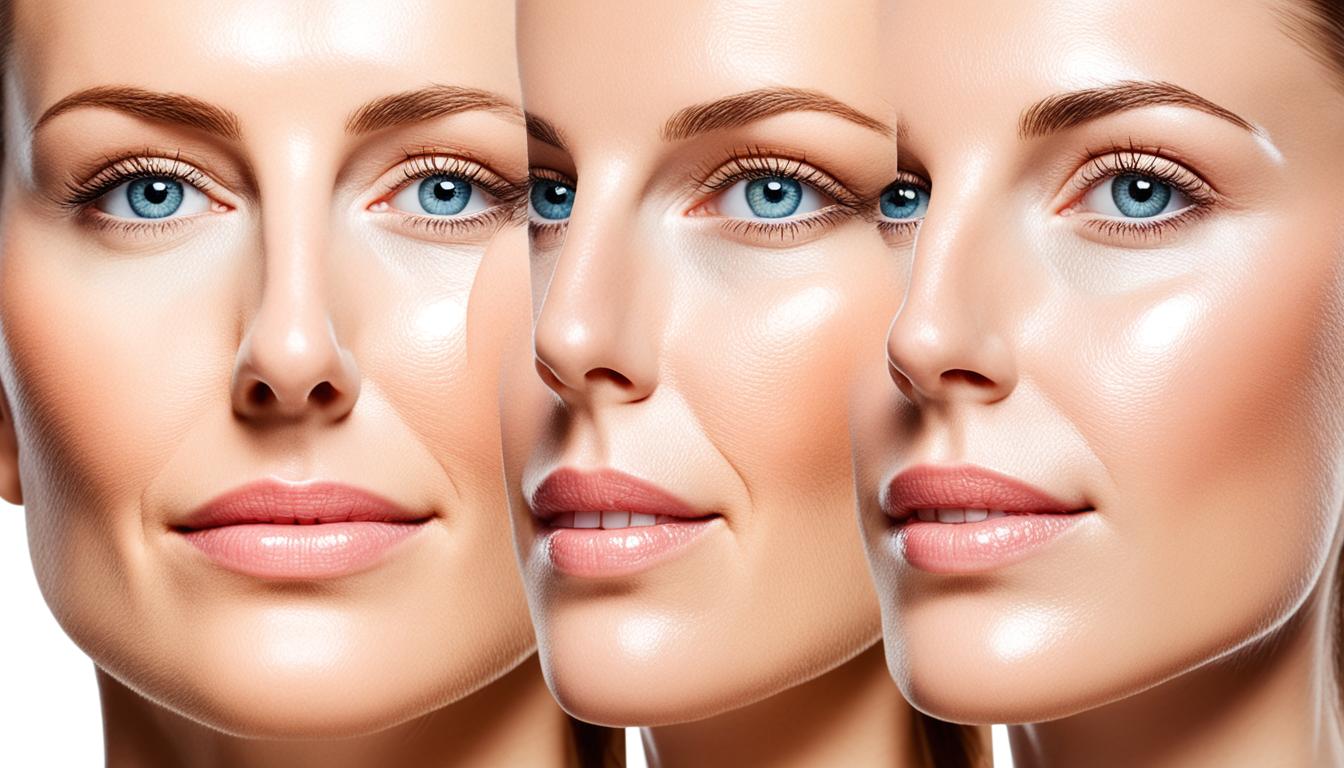Beauty
Clear Skin with Retinol Research
Nearly 70% of Australians view skin health as a critical aspect of overall well-being. The quest for skin care emphasizes attaining clear skin, highlighting the importance of vitamin A derivatives. Specifically, retinol has been at the forefront, initiating a shift in topical treatments. This ingredient has established itself as a significant force in combating skin concerns, leveraging its potent capability.
The benefits of retinol extend beyond superficial enhancements. It penetrates to the cellular level, stimulating cell renewal and enhancing collagen production. Consequently, aging signs diminish, hyperpigmentation lightens, and the skin’s texture becomes smoother. This leaves an enviable, clear complexion. Furthermore, there is an increasing focus on the educated use of retinol. Therefore, it’s essential to know how to integrate these powerful vitamin A derivatives into your regimen.
Key Takeaways
- Retinol, a vitamin A derivative, is key to promoting a clear complexion and overall skin health.
- It aids in cell turnover and boosts collagen production, providing significant skin care benefits.
- A mindful approach to retinol use is advised, particularly for individuals with sensitive or reactive skin conditions.
- Starting with lower retinol concentrations and gradually building up can help establish skin tolerance.
- Alongside retinol, other ingredients such as resveratrol and vitamins E and C can contribute to a balanced skin care regime.
- Professional advice is recommended to navigate retinol usage effectively and safely.
Understanding Skin Aging: Chronological vs Photoaging
Exploring the terrain of skin aging, we must identify the clear distinctions between intrinsic aging—your body’s genetic programming, and photoaging, primarily caused by UV radiation. Gaining insight into the aging mechanisms allows for proactive skincare tactics. These can ensure skin vitality and longevity.
Intrinsic aging marks the body’s chronological progression, altering skin texture and elasticity subtly. Conversely, photoaging manifests through stark signs: deep wrinkles, rough texture, and uneven skin tone. This form highlights the impact of UV radiation, which hastens skin component breakdown and DNA damage via pyrimidine dimer formation.
| Aspect of Aging | Intrinsic Aging | Photoaging |
|---|---|---|
| Causative Factors | Genetic timeline and biological clock | Cumulative exposure to UV radiation |
| Signs on Skin | Fine lines, thinning, and gradual loss of elasticity | Deep wrinkles, coarseness, hyperpigmentation |
| Underlying Changes | Reduced collagen production, slowing cellular turnover | Increased genetic mutations, damage to proteins like collagen and elastin |
The acknowledgment that photoaging stems mainly from environmental and lifestyle factors, like sun exposure and tanning, drives a commitment to UV protection. Implementing skincare routines that defend and rejuvenate the skin is crucial. Protecting your skin is a commitment to the health of the body’s largest organ, ensuring its thrive through all life stages.
The Science Behind Retinol: Fighting the Effects of Ageing
The quest for youthful skin has significantly advanced our understanding of retinol science. It highlights its crucial role in skin rejuvenation. Acting as a leading anti-aging treatment, retinol uses biochemical pathways to enhance cellular health and reduce age indicators. Knowing how retinol facilitates these rejuvenating effects enables informed decisions about skincare practices.
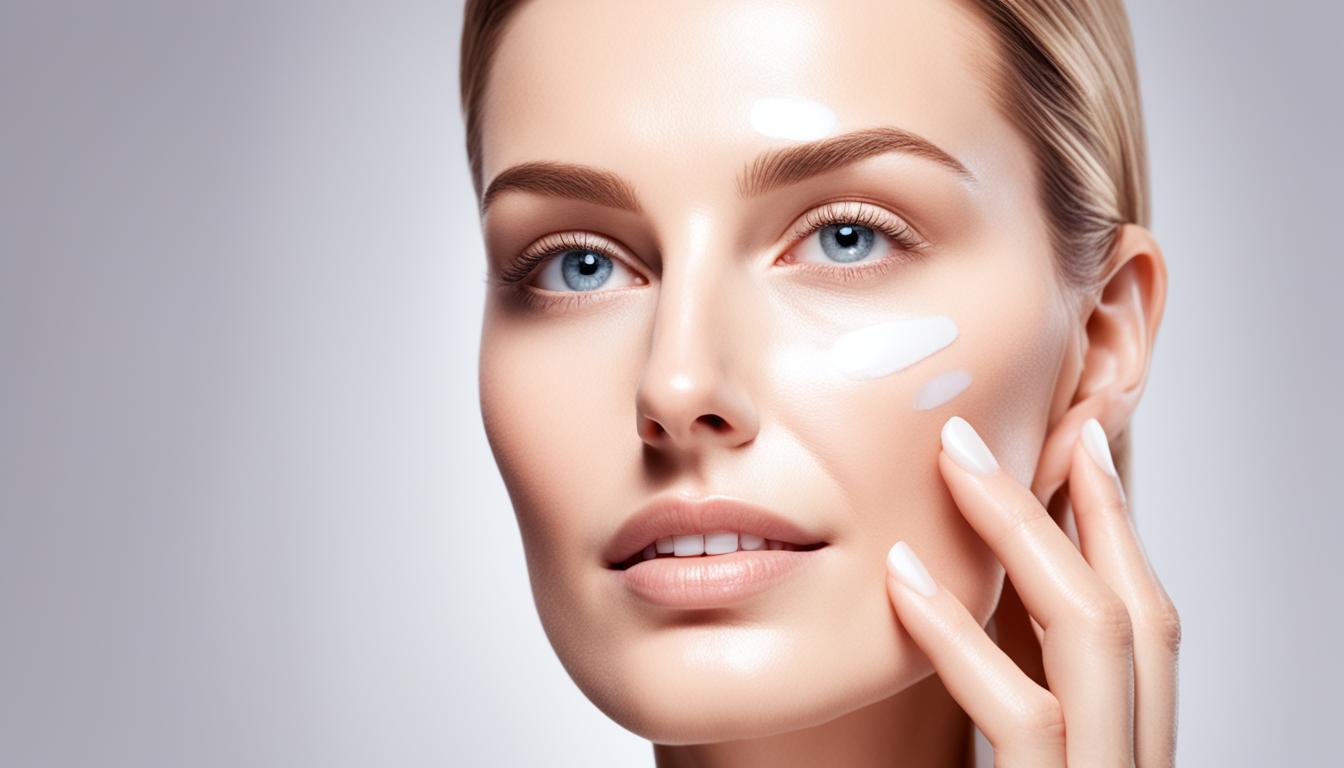
How Retinol Supports Skin Rejuvenation
Retinol’s effectiveness in skin renewal is well-supported by biomedical research, not merely promotional claims. It penetrates the skin layers to alter gene expression through retinoid therapy. This leads to a biochemically driven renewal of the skin, manifesting as visibly rejuvenated skin. It improves skin processes that remove old cells and increase new cell production, making it essential in anti-aging efforts.
Addressing Skin Concerns with Retinoids
While retinol is prized for its skin rejuvenation benefits, not every variant suits all users. Certain retinoids, like tretinoin and tazarotene, may cause adverse effects, necessitating the development of gentler alternatives. Retinaldehyde offers a milder option within the retinoid family, facilitating the benefits of retinoid therapy while minimizing skin irritation.
Evaluating different anti-aging treatments reveals their unique advantages and aligns them with specific skincare needs:
| Retinoid | Benefits | Potential Side Effects | Best For |
|---|---|---|---|
| Retinol | Cell turnover, anti-wrinkle | Mild irritation | All skin types, beginners |
| Tretinoin | Strong acne control, signs of photoaging | Peeling, redness | Oily, acne-prone skin |
| Tazarotene | Potent anti-aging effects | Dryness, peeling | Resilient skin, aging concerns |
| Retinaldehyde | Antioxidant properties, less irritating | Minimal | Sensitive skin, retinoid beginners |
This knowledge empowers you to confidently explore the world of retinoids. View these agents as the architects of your skin’s future, crafting an appearance that withstands time’s effects while prioritizing your comfort.
Retinol: Key Ingredient in Dermatology for Acne Management
The paramount importance of retinol within dermatology, especially regarding acne treatment, is undeniable. By modulating keratinocyte activity, sebum output, and inflammation, topical retinoids have emerged as the primary solution for this prevalent skin issue.
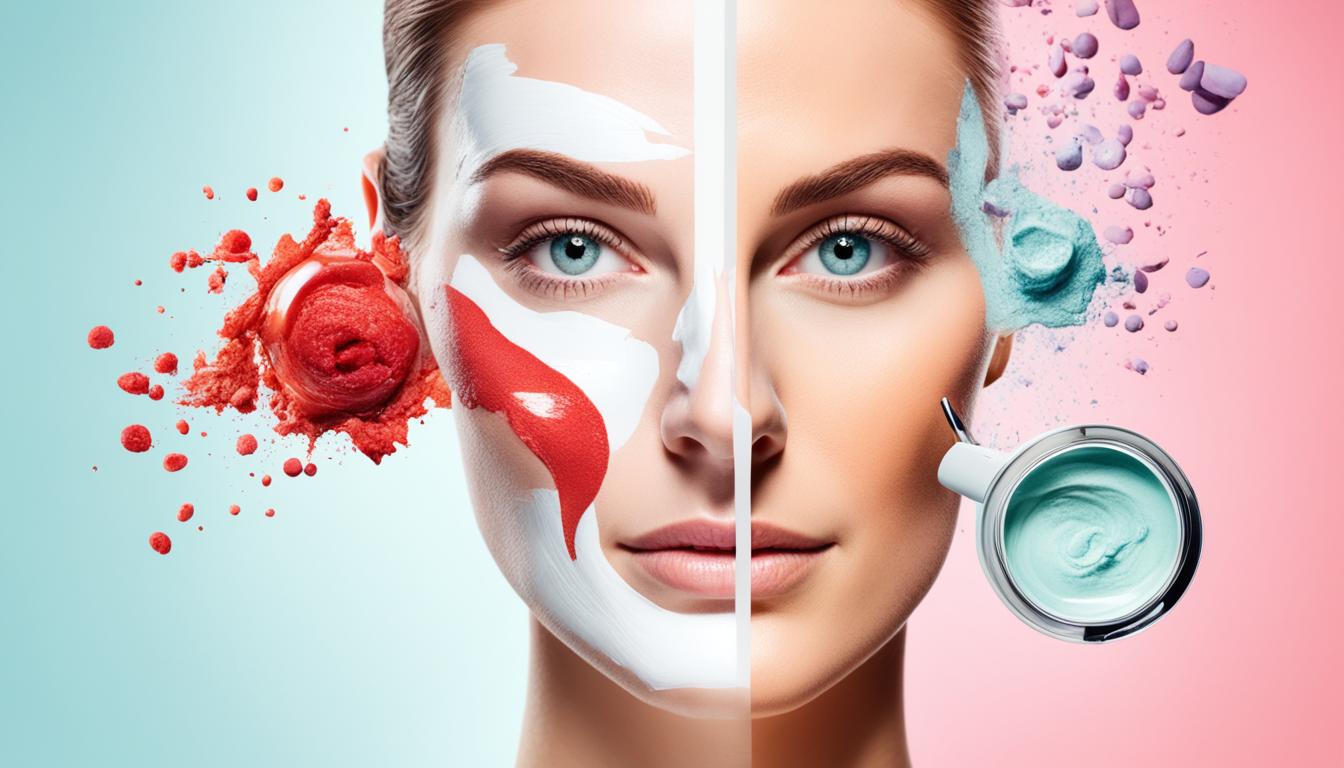
However, the acceptance of retinol and its compounds in clinical settings often fails to mirror their proven effectiveness. This discrepancy suggests a gap between theoretical research and practical acne management applications, indicating the necessity for practitioners to become more acquainted with retinol’s advantages.
Retinol stands as a testament to the synergistic intersection of chemistry and skincare, delivering potent results in the management of acne, a condition that can deeply affect wellbeing and confidence.
- Regulation of keratinocyte turnover reducing clogged pores
- Decreased sebum production to prevent comedogenesis
- Anti-inflammatory action to minimize the occurrence of acne lesions
Dermatological guidelines universally recognize retinol’s vital role, affirming its inclusion in therapeutic approaches. These guidelines guide dermatologists towards prescribing potent acne treatment protocols, aiming to assist patients in attaining the clear, healthy skin they deserve.
For individuals grappling with persistent acne or practitioners striving to enhance patient care, the significance of retinol in dermatology is paramount. While pursuing a clearer complexion presents its hurdles, retinol offers a comprehensive strategy for acne treatment. This makes the journey towards healthier, more robust skin an endeavor worth undertaking.
The Vital Role of Collagen in Skin Health and How Retinol Helps
Exploring the role of collagen in skin health reveals its cruciality as the skin’s structural support. Our skin derives its strength and elasticity from collagen’s plentiful presence. With aging, we see a reduction in this critical protein, leading to sagging and wrinkles. Thankfully, retinol emerges as a formidable ally, combating aging effects. Its capacity to rejuvenate the skin distinguishes retinol, shaping our skincare approach as a long-term investment.
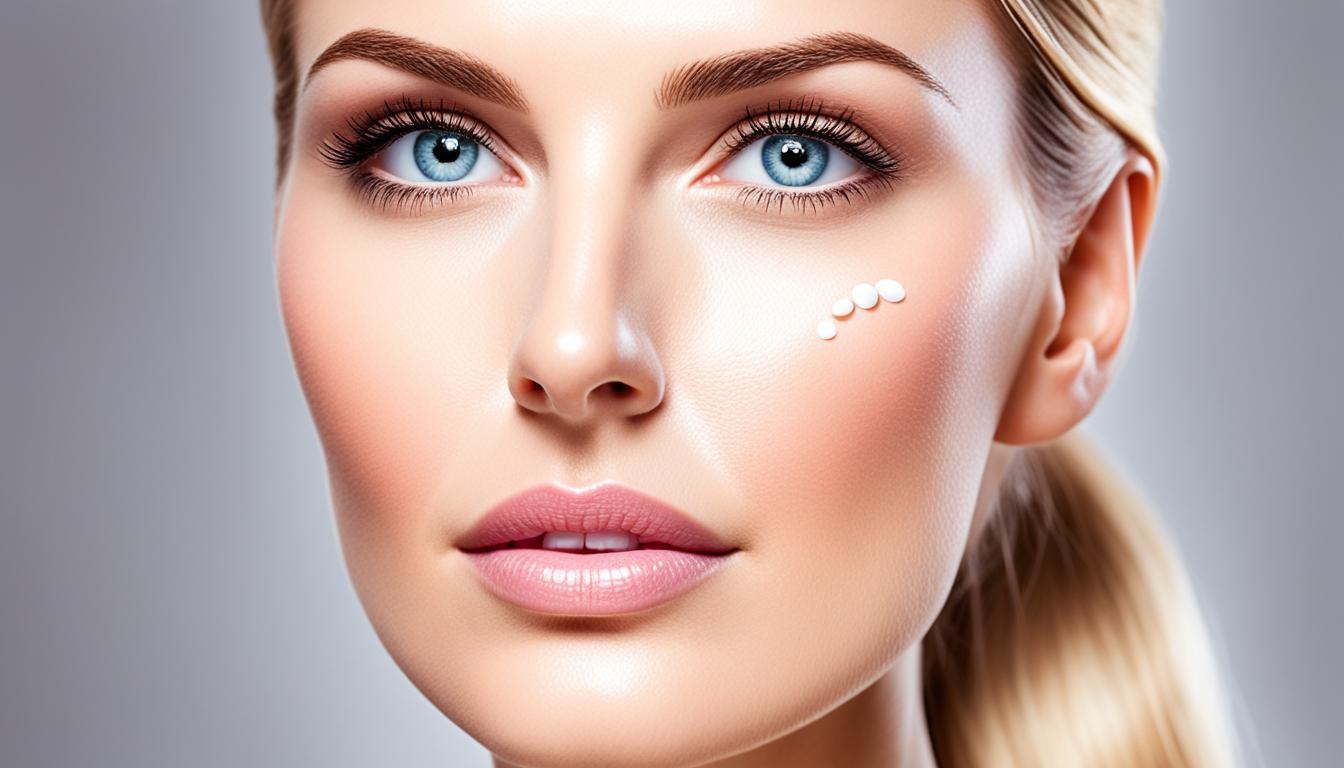
Collagen Production and the Impact of Retinol
Retinol transcends being merely a superficial solution; it delves deep, enhancing the skin’s inner strength. It acts by boosting collagen production, effectively compensating for losses inflicted by time and environmental damage. This bolstering of the skin’s foundational layer diminishes aging signs, thereby enhancing its resilience and appearance.
Retinol’s Effects on Skin Elasticity and Fine Lines
In the quest for elastic skin and reduced wrinkles, retinol proves an indispensable partner. It strengthens the skin’s elastic structure, smoothing existing lines while preventing new ones. This ensures a sustained enhancement of your skin’s elasticity, making it a crucial step in your skincare routine.
Never overlook the significance of a comprehensive skin care approach toward fostering confidence. Including retinol in your regimen not only maintains skin wellness but also promotes a youthful, rejuvenated appearance for the future.
Retinoids in Skincare: Forms and Differences
In the expansive realm of skincare ingredients, navigating the assortment of types of retinoids is both complex and advantageous. These retinol derivatives are heralded in anti-aging formulations. Comprehension of their unique properties is crucial. This exploration aims to elucidate their differences, facilitating an informed choice for your skincare regimen.
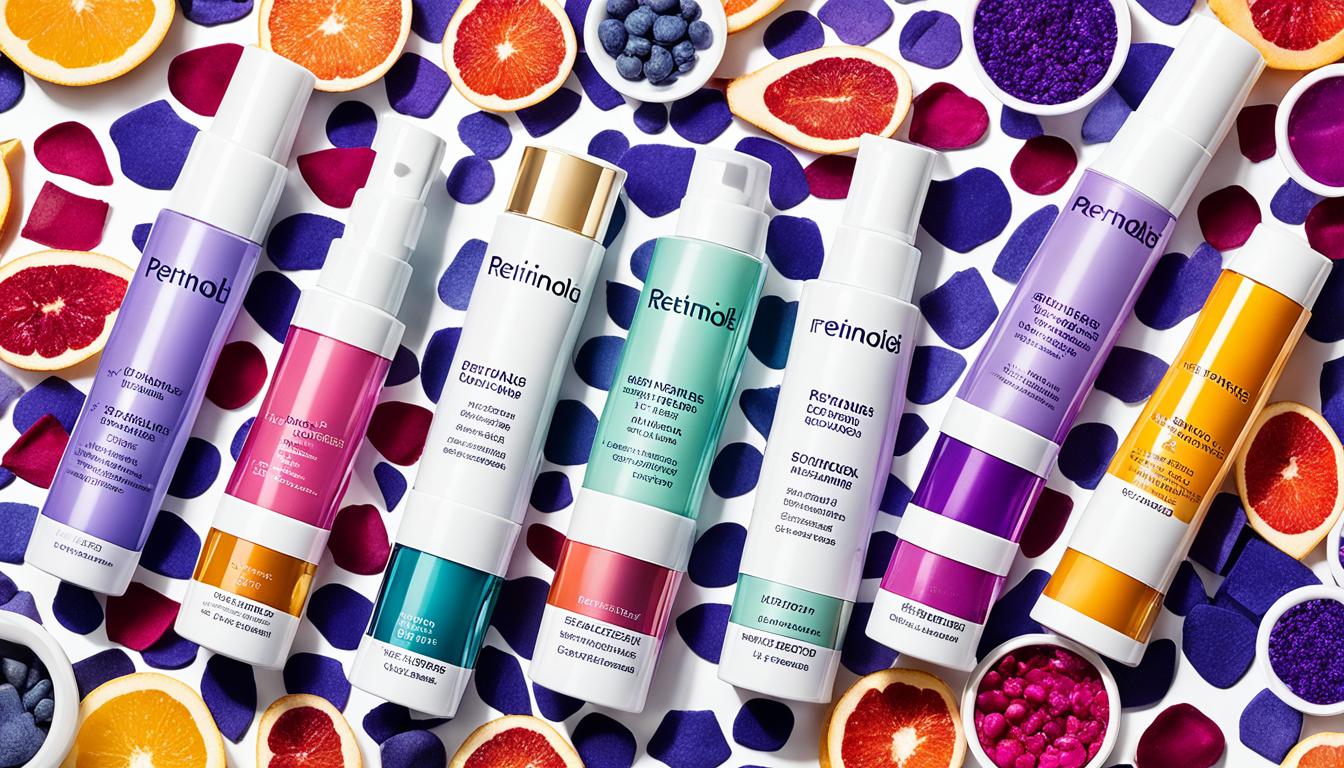
The journey begins with potent variants such as tretinoin and tazarotene, renowned for their efficacy against aging signs. Prescription requirement and potential irritation are notable, potentially deterring continued usage. For individuals with sensitive skin or newcomers to retinoids, alternative solutions exist.
Among these, Retinaldehyde and retinol are deemed gentler, predominantly found in over-the-counter offerings. Their inclusion yields considerable anti-aging benefits with reduced risk of irritation. Thus, they have risen in preference for everyday skincare routines.
| Retinoid Type | Main Benefits | Common Usage | Potential Irritation | Suitability |
|---|---|---|---|---|
| Tretinoin | Intense anti-aging, acne treatment | Prescription-based | High | Robust skin or under medical guidance |
| Tazarotene | Strong anti-aging, psoriasis care | Prescription-based | High | Robust skin or under medical guidance |
| Retinaldehyde | Effective anti-aging, less irritating | Over-the-counter options | Medium | Most skin types, sensitive skin |
| Retinol | Anti-aging, acne treatment, mild impact | Over-the-counter options | Low to Medium | All skin types, including beginners |
Personalising your skincare ingredients to harmonize with your skin’s tolerances and requirements is paramount. This applies irrespective of whether you are utilizing prescription types of retinoids or their milder retinol derivatives. Initiation should be with lower concentrations, incrementally escalating as tolerance develops.
Remember, while retinoids are transformative skincare ingredients, their power must be harnessed with care and patience.
Maximising the Benefits of Retinol in Your Skincare Regime
Incorporating retinol into your skincare regimen can significantly enhance the appearance of your skin, but it requires precise execution. By mastering the optimal application techniques and adeptly pairing skincare components, the true capabilities of this acclaimed active ingredient can be harnessed.
Correct Application of Retinol for Optimal Results
Initiate your retinol regimen with lesser concentrations, monitoring your skin’s reaction carefully. Employ retinol primarily during the night as it is the period when your skin naturally undergoes repair, thus magnifying the rejuvenating benefits of retinol. The significance of patience cannot be overstated; it’s crucial to allow your skin ample time to adapt to retinol and mitigate any initial adverse effects.
Combining Retinol with Other Skincare Products
Although retinol is formidable on its own, synergizing it with other skincare ingredients can enhance or diminish its efficacy. To maintain the skin’s balance, refrain from using retinol alongside vitamin C or exfoliants such as glycolic acid in the same regimen. Instead, orchestrate your skincare routine to complement retinol’s advantages while protecting against its propensity to heighten UV sensitivity.
The effectiveness of retinol is well-documented, yet its interaction with other potent skincare substances demands careful deliberation. Engaging with a skincare professional to design a regimen that acknowledges your skin’s specific requirements and the potent nature of retinol is advisable.
| Skincare Ingredient | Complements Retinol | May Conflict with Retinol |
|---|---|---|
| Sunscreen | Yes (Daily use) | No |
| Vitamin C | Alternate application | Immediate combination |
| BHA/AHA Exfoliants | Use separately | Same session application |
| Hydrating Agents (Hyaluronic Acid) | Yes | No |
| Niacinamide | Yes | No |
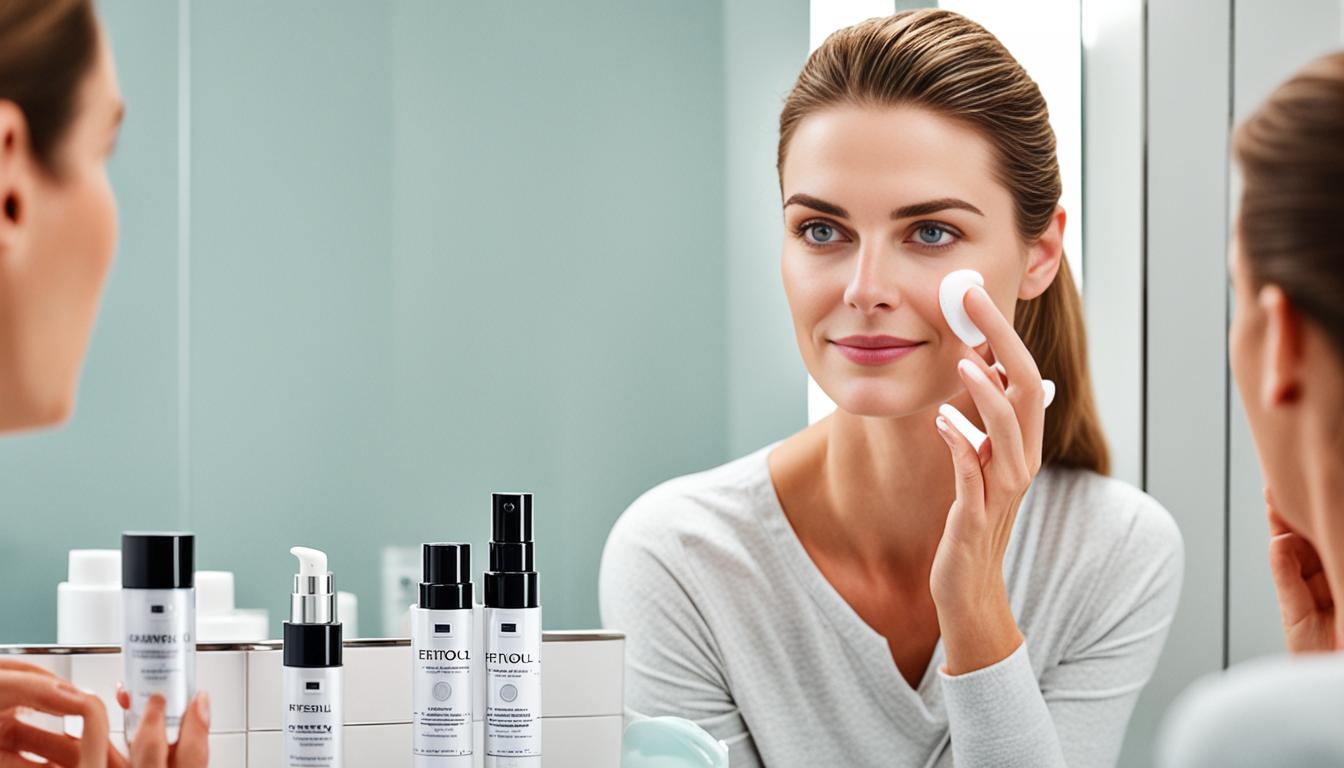
Navigating Retinol Concentrations and Product Selection
When delving into the realm of skincare product selection, comprehending the spectrum of retinol concentrations is essential. It transcends the mere act of choosing a retinol product. The essence lies in matching the correct retinol potency with your skin’s specific requirements. Initially, opting for a milder concentration is wise, allowing your skin to acclimate without undue stress, especially for retinol novices or those with sensitive skin.
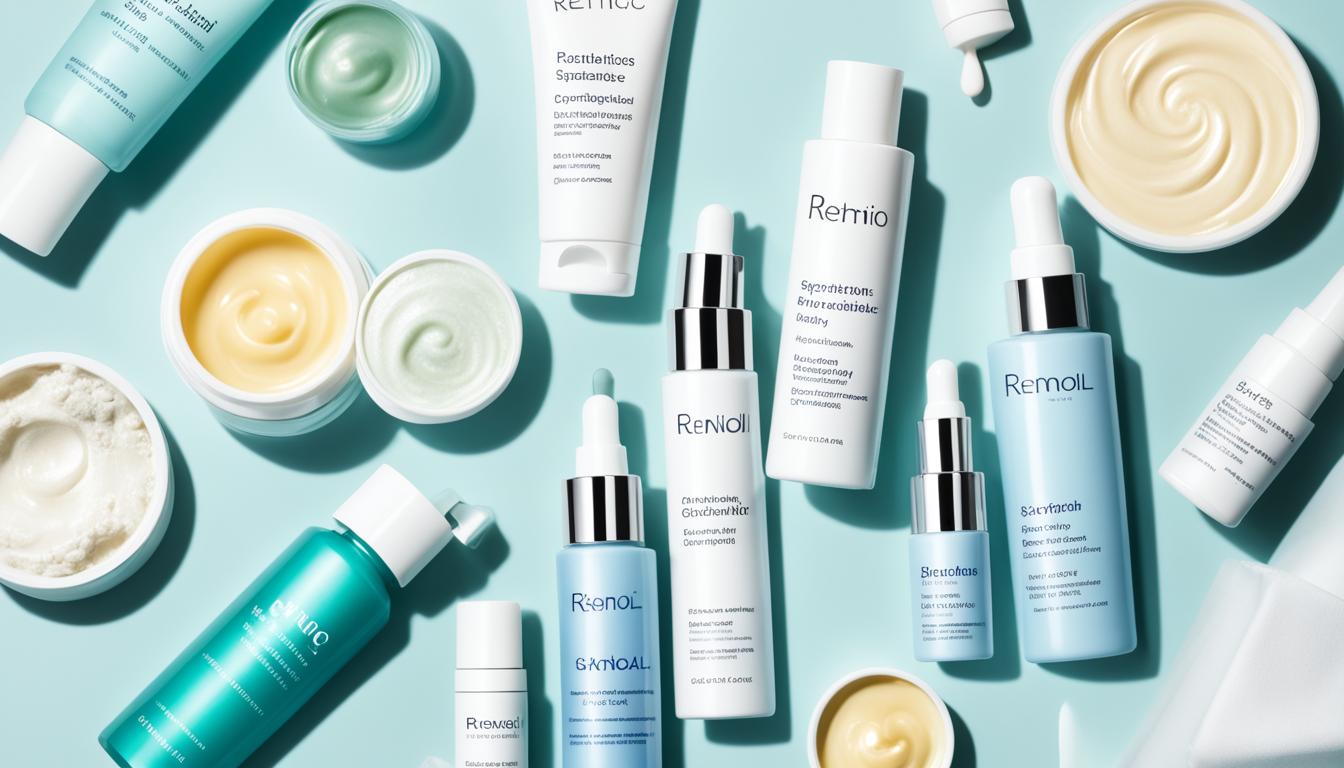
Gradually escalating the concentration of retinol is advised to foster tolerance while minimizing irritation risks. This methodical escalation prepares your skin to robustly assimilate retinol’s transformative properties progressively. The ultimate aim focuses on striking a harmonious balance between the treatment’s effectiveness and maintaining skin comfort.
| Retinol Concentration | Suitable For | Expected Benefits | Typical Usage |
|---|---|---|---|
| 0.2% – 0.5% | Beginners & Sensitive Skin | Hydration, Gentle Exfoliation | Every other night, building up to nightly use |
| 0.5% – 1% | Intermediate Users & Robust Skin | Increased Collagen Production, Wrinkle Reduction | Nightly, following a period of acclimatization |
| 1% and above | Experienced Users & Resilient Skin | Significant Texture Improvement, Pigmentation Reduction | Nightly or as directed by a skincare professional |
Advancing through each retinol concentration level demands caution and patience. Premature progression can derail your skincare objectives, leading to regress rather than advancements. Consulting with a skincare expert is crucial to tailor your retinol regimen, thereby ensuring optimal outcomes without jeopardizing your skin’s well-being.
Retinol and Sun Sensitivity: Protecting Your Skin from UV Damage
Introducing retinol into your skincare routine brings about retinol sun sensitivity. This increases your skin’s susceptibility to UV rays, necessitating a committed use of sunscreen. It’s essential to protect your skin to keep it healthy while using retinoids. Here, we explore strategies for effective UV protection and proficient photosensitivity management.
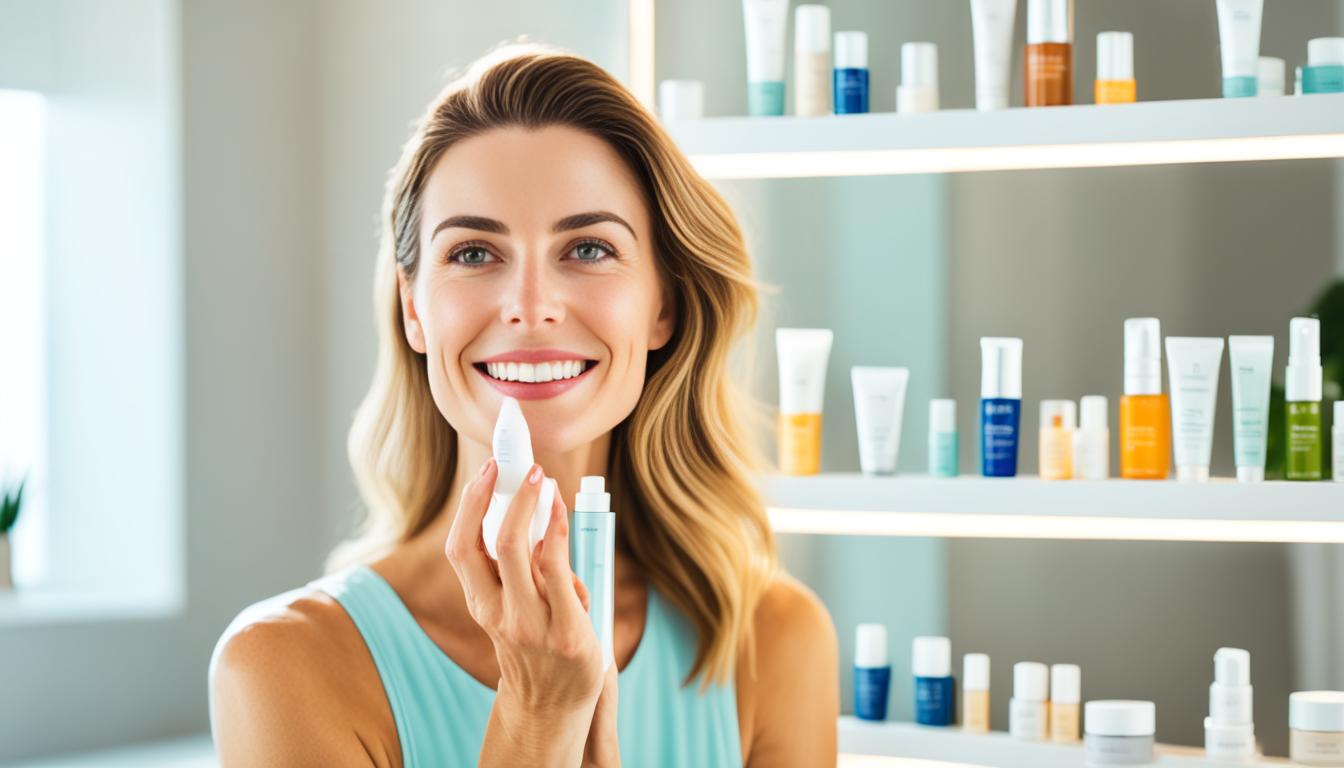
Importance of Sunscreen Use with Retinol Treatments
Incorporating a high-grade sunscreen into your daily skincare is crucial when on retinol treatments. Broad-spectrum sunscreens, which fend off UVA and UVB rays, are especially critical. They help avert premature aging and skin damage. An ample layer of sunscreen acts as a vital shield, effectively managing retinol sun sensitivity.
Managing Increased Photosensitivity When Using Retinoids
Effective photosensitivity management revolves around habitual sunscreen application, parallel to your retinol usage. Opt for sunscreens compatible with retinol-enhanced skin. This ensures a smooth blend into your skincare regimen while enhancing UV protection.
| Sunscreen Feature | Benefit with Retinol | Application Tip |
|---|---|---|
| Broad-spectrum | Guards against UVA and UVB rays | Apply liberally 15 minutes before sun exposure |
| SPF 30 or higher | Meets dermatologist recommendations for optimal protection | Reapply every two hours, or immediately after swimming or sweating |
| Water-resistant | Stays effective during swimming or sweating | Ideal for active days or when in contact with water |
| Non-comedogenic | Prevents pore blockages, aligning with retinol’s acne-fighting properties | Choose formulas that suit your skin type, be it oily, dry, or combination |
| Fragrance-free and hypoallergenic | Reduces the risk of irritation, particularly crucial for retinol-treated skin | Perfect for those with sensitive skin or fragrance allergies |
Employing the right sunscreen enhances retinol’s age-defying effects, securing a vibrant, healthy complexion. When unsure about retinol sun sensitivity, seek a dermatologist’s guidance for personalized advice and reassurance.
Retinol’s Role in Reducing Acne and Acne Scarring
In tackling acne and its subsequent scarring, clear skin solutions become accessible via retinol treatment. As an established agent in acne reduction, retinol facilitates skin cell turnover normalization. This action diminishes acne and deters pore blockages. Concurrently, retinol bolsters scar healing through accelerated cellular renewal, enhancing skin surface repair and rejuvenation.
A regimen rooted in retinol has been shown to markedly enhance acne vulgaris conditions. The journey toward clear skin solutions is profoundly supported by retinol. It addresses active breakouts and heals prior skin damage. Through procollagen induction, retinol also makes scars less visible, promoting a smoother, refined skin texture.
| Benefit | Effect of Retinol | Outcome |
|---|---|---|
| Acne Prevention | Regulates skin cell turnover | Reduced frequency of acne flare-ups |
| Acne Treatment | Anti-inflammatory properties | Decreased severity of active acne lesions |
| Scar Healing | Stimulates collagen synthesis. | Improved skin texture and reduced scarring appearance |
| Sebum Control | Modulates sebum production | Balanced skin oil levels leading to fewer clogged pores |
Addressing persistent acne and scarring emerges as a formidable endeavor. Incorporating retinol treatment into your skincare ritual brings tangible benefits in scar healing and fostering a clear complexion. However, it is crucial to gradually integrate retinol into your care routine to minimize irritation.
As you embark on the path to clear skin, retinol stands out as a viable, potent solution. Heeding usage and application recommendations can unveil the transformative advantages of retinol in managing acne reduction and scar healing.
Over-the-Counter Retinol: Evaluating Effectiveness and Safety
In the quest to integrate over-the-counter retinol into your skincare regime, identifying the appropriate product necessitates an understanding of retinol concentrations. Achieving an effective skin routine commences with diligent concentration evaluation. This crucial step ensures the optimization of retinol’s advantages while mitigating risk of skin irritation.
Decoding the Concentrations: What’s Best for You
Delving into the realm of over-the-counter retinol treatments requires scientific precision. It is crucial to determine the correct concentration that suits your skin’s needs. Beginning with a gentler formulation and gradually increasing the frequency allows your skin to adapt. This method serves to limit discomfort and paves the way for skin revitalization.
| Retinol Concentration | Suggested Use | Expected Outcomes |
|---|---|---|
| Low (0.2% – 0.5%) | Beginners or sensitive skin types | Gradual improvement in texture and tone with minimal irritation |
| Medium (0.5% – 1%) | Experienced users with established tolerance | Visible reduction in signs of ageing, such as fine lines and uneven pigmentation |
| High (1% and above) | Those accustomed to retinol seeking advanced treatment | More pronounced anti-ageing effects, increased likelihood of irritation |
Side Effects and Irritation: When to Consult a Dermatologist
Integrating over-the-counter retinol into your skincare routine may initially induce minor side effects, including dryness and flaking. Nonetheless, persistent or intense skin irritation necessitates professional dermatologist consultation. A dermatologist can offer profound insights on whether to continue using, modify, or discontinue retinol. Additionally, they might propose custom treatment options that better suit your skin’s distinct needs.
Navigating through the array of over-the-counter retinol offerings requires both patience and acuteness towards how your skin reacts. By meticulously assessing concentrations and staying alert to any irritations, you embolden a secure and effective skincare exploration.
Personalising Retinol Use for Sensitive Skin Types
For those with sensitive skin, the broad array of retinol offerings can seem overwhelming. Personalized skincare becomes essential in integrating sensitive skin retinol into your regimen. Unlike generic approaches, customized plans honor the distinct needs of your skin, using gentle formulations designed to comfort rather than exacerbate.
Start with a patch test on a small skin section, noting any reactions before applying more extensively. The focus should be not only on potency but also on the composition. Specifically designed products for sensitive skin often combine soothing agents with retinol to mitigate unwelcome reactions.
- Identify retinol products that are formulated with other soothing agents.
- Opt for retinol products that come in cream bases, as they tend to be more hydrating.
- Focus on finding brands that are known for gentle formulations, suitable for sensitive skin types.
For some individuals, even the most benign retinol formulations may prove intolerable. Alternatives like bakuchiol, providing comparable advantages minus the irritation, might be worth considering. Remember, retinol use is a deeply personal endeavor. It must accommodate your skin’s preferences and thresholds, aiming for efficacy without the trade-off of discomfort. Consulting with a dermatologist can further refine a personalized skincare strategy, possibly incorporating retinol substitutes or specialized treatments for sensitive skin.
Observing your skin’s reaction to retinol is crucial for those with a tendency towards sensitivity. By heeding the responses of your skin, you can fine-tune your regimen. This ensures retinol is a positive enhancement to your skincare routine, not a detriment to your skin’s health.
Combating Hyperpigmentation: Retinol as a Pigment Corrector
The journey towards achieving an even skin tone often compels individuals to investigate myriad treatments. Among these, retinol emerges as a distinguished aid. It stands as a beacon for those striving to diminish pigmentation issues such as dark spots and discolored patches. Scientific research corroborates retinol’s ability to correct these problems effectively. When tackling conditions like melasma and post-inflammatory hyperpigmentation, retinol accelerates skin’s natural renewal process. This action gradually fosters a more luminous and uniform complexion.
The Science Behind Retinol and Skin Tone Evenness
Retinol’s success in improving skin tone uniformity is owed to its potent stimulation of cellular turnover. This enhanced exfoliation process not only prompts the rise of fresh skin cells but also interrupts melanin synthesis, the culprit behind pigmentation. Through habitual retinol application, individuals harness a scientifically validated approach. It subtly eliminates unwanted pigmentation, paving the way for a harmonious and glowing skin tone.
Retinol’s Effectiveness Against Melasma and Post-Inflammatory Hyperpigmentation
Retinol proves exceptionally beneficial for those grappling with stubborn melasma or the lingering marks from acne, known as post-inflammatory hyperpigmentation. It adeptly targets the mechanisms responsible for melanin production. By doing so, retinol not only rectifies present skin discoloration but also deters future pigment anomalies. However, it’s imperative to use retinol judiciously, recognizing and mitigating potential adverse effects. Customizing application methods and skin care regimens to suit individual skin requirements is essential for optimal results.
FAQ
What are the benefits of using retinol in skin care?
Can you explain the difference between intrinsic aging and photoaging?
How does retinol aid in skin rejuvenation?
What role does retinol play in acne treatment?
How does retinol impact collagen production and skin elasticity?
What are the different forms of retinoids and their applications?
How should retinol be applied for optimal results?
How do I choose the correct retinol concentration for my skin?
Why is sunscreen important when using retinol treatments?
Can retinol help with acne scarring?
What should I know about over-the-counter retinol concentrations?
Is retinol suitable for sensitive skin types?
How does retinol work as a pigment corrector for hyperpigmentation?
Source Links
- https://www.harpersbazaar.com/beauty/skin-care/a37081493/retinol-for-skin-right-for-you/
- https://www.ncbi.nlm.nih.gov/pmc/articles/PMC5574737/
- https://www.ncbi.nlm.nih.gov/pmc/articles/PMC2699641/

